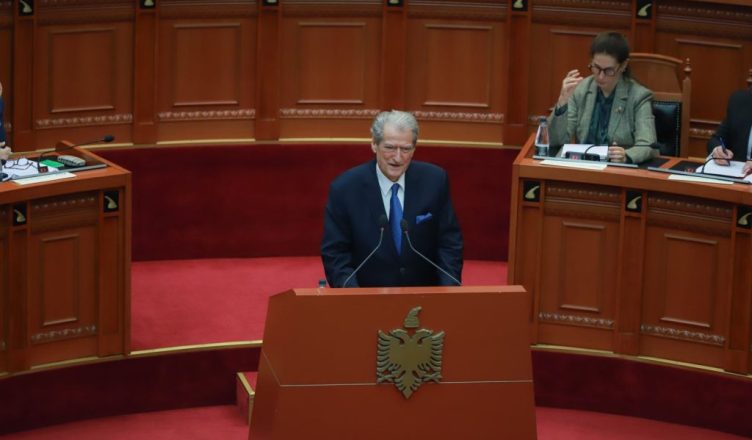Berisha downplays accusations of links to Elbasan gang by DP parliamentary group chief as “political declarations”

On his first day back in Parliament after 11 months under house arrest, Democratic Party leader Sali Berisha was asked by journalists about past accusations of collaborating with the Elbasan gang led by Suel Çela. These accusations were made by his own parliamentary group leader, Gazment Bardhi. In typical fashion, Berisha dismissed the allegations, stating, “Political declarations are just that—political. They hold no value.”
Why is this important: Berisha’s response highlights a recurring pattern in his long political career: he often makes extreme accusations against rivals, alleging corruption or criminal ties for political gain. Yet, when similar allegations are leveled against him or his allies, he downplays them as inconsequential or merely political in nature. This dual approach underscores a broader perception of Albanian politics as highly transactional and often devoid of accountability, where alliances and accusations shift based on expediency.
Context: Gazment Bardhi’s accusations against Berisha surfaced during a period of intense internal conflict within the Democratic Party in 2021. At the time, Bardhi accused Berisha and DP Secretary General Flamur Noka of collaborating with Suel Çela to secure control over local party branches. Bardhi claimed that Çela had pressured Democratic Party members in Elbasan to support Berisha’s campaign to oust then-leader Lulzim Basha.
“Suel Çela works for Berisha,” Bardhi declared at the time, alleging that the gang used intimidation tactics to secure signatures supporting Berisha. Bardhi, then a close ally of Basha, was one of Berisha’s fiercest critics and had even pledged to leave the DP if Berisha regained control of the party.
Broader implications: Berisha’s dismissal of Bardhi’s accusations as mere “political declarations” reflects a tactic he has employed throughout his career. For over three decades, Berisha has frequently accused political opponents of severe misconduct, including corruption, adultery, and even murder, only to later dismiss all accusations as politically motivated and align with some of these figures when political dynamics changed. For instance, Berisha once accused Ilir Meta of stealing Albania’s gold reserves and engaging in criminal activities, yet later joined forces with him in opposition to Prime Minister Edi Rama.
Berisha has also made highly personal accusations against opponents, ranging from financial scandals to claims of illegitimate children, only to later write them off as political rhetoric. This approach has contributed to a highly polarized political environment in Albania, where accusations are often perceived as tools for short-term gain rather than genuine efforts to pursue justice or accountability.
What’s next:As Berisha continues to lead the Democratic Party, questions persist about the opposition’s credibility. The lack of consistency in its rhetoric, combined with the legal troubles faced by Berisha and other party members, undermines the DP’s ability to effectively position itself as a credible anti-corruption force. Moreover, its persistent attacks on justice reform further erode its standing among the Albanian public, leaving its role as a viable alternative to the ruling Socialist Party in doubt.


